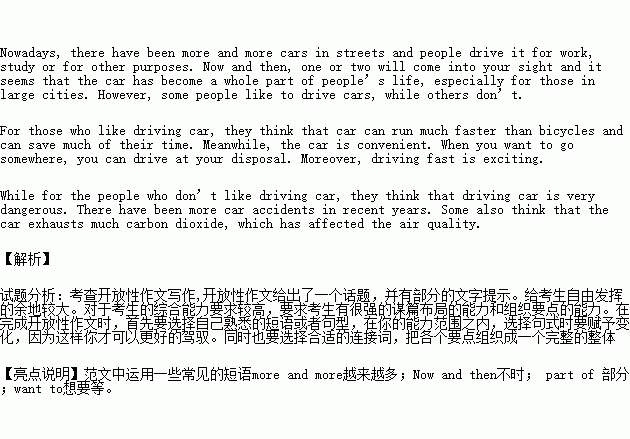题目内容
书面表达
请以“On Driving Cars”为题,按下面所给提示,写一篇字数在100左右的短文。
第一句已给出,字数不计。
1. 如今,路上的汽车越来越多;
2. 一些人喜欢开汽车的原因;
3. 另外一些人不喜欢开汽车的原因。
Nowadays, there have been more and more cars in streets and people drive it for work…
________________________________________________________________________
________________________________________________________________________
________________________________________________________________________
________________________________________________________________________
________________________________________________________________________
________________________________________________________________________
 星级口算天天练系列答案
星级口算天天练系列答案 芒果教辅达标测试卷系列答案
芒果教辅达标测试卷系列答案七选五
Although many Chinese students say their knowledge of English grammar is good, most would admit that their spoken English is poor. 1._________ However, their spoken English does not have to remain poor. I would suggest that there may be some reasons for their problems with spoken English.
First, 2. Obviously the better answer is to expand their vocabulary. However, you can speak with a limited vocabulary if your attitude is positive. Others will follow you as long as you use the words that you know.
Second, 3._.Sometimes they make mistakes when they are speaking because they are shy and nervous. Yet students should remember that their goal should be FLUENCY NOT ACCURACY. You want to get your message across, to talk to someone in English, as quickly and as well as you can, even though sometimes you may use a wrong word or tense, but it doesn't matter because the person you are speaking to will understand you and make allowance for any mistakes he hears.
Third, 4._ .You have one mouth but two ears! All that hearing is necessary for you to start speaking.
Fourth,5._ .Instead of actively seeking out opportunities to improve their spoken English, they passively wait for speaking opportunities to come to them and wonder why their spoken English always remains poor. If you have this proactive outlook, then you will see English opportunities wherever you go.
A.not enough attention is paid to listening. B. they fail to find suitable words to express themselves because of limited vocabulary. C.most Chinese students are not active language learners. D.They are so stupid that they cannot finish their necessary homework in time. AB.Whenever I speak to Chinese students they always say, “My spoken English is poor.” AC.it is no use crying over spilt milk. AD.they are afraid of making mistake. |

